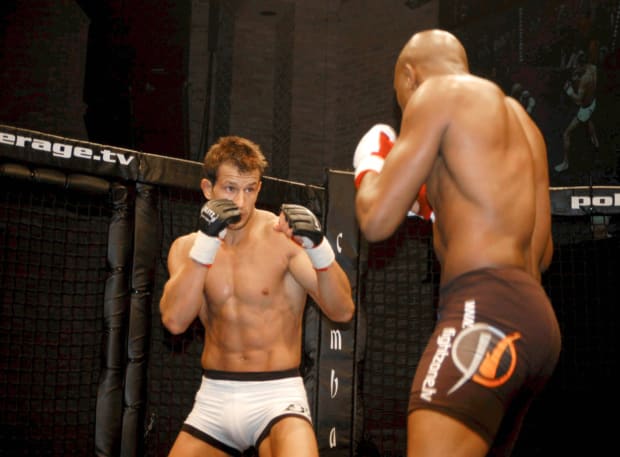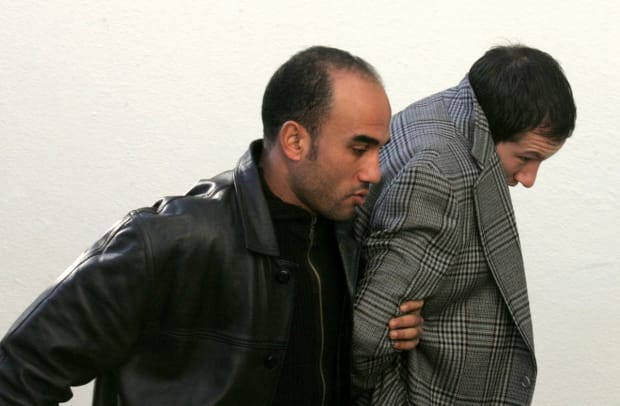A personal story. It was the late 2000s. The UFC was still fighting for legitimacy. And I got a call. Chuck Liddell would be in New York. Did I want to meet him for a drink/interview? Sure. We headed to my watering hole of choice—RIP to The Half King—and talked shop.
I had returned from a visit to the Miletich camp in Iowa, and we gossiped about the stable of fighters there. The name “Lee Murray” surfaced. I asked what had happened to him. Liddell laughed, and said words to the effect of, Look that one up when you go home. I don’t want to spoil it.
What happened to Lightning Lee Murray, a British fighter built like a greyhound, best known for starching Tito Ortiz in a legendary London back alley brawl? He was living large. But it wasn’t on account of fighting. The source of his wealth: He had merely helped orchestrate the largest heist in the history of Europe. More rollicking still: He had escaped to Morocco, which had no extradition policy with the U.K.

Jules Annan/Avalon/Getty Images
I dropped whatever Sports Illustrated assignment I had been working on and wrote a story on Murray published in the April 14, 2008, issue entitled “Breaking the Bank.” Murray was always a badass, raised in a rough part of London. As a UFC fighter—and this sometimes gets shortchanged in the retelling—he was completely legit, once even going the distance with the great Anderson Silva. Not long after that fight, he put on a mask and helped pull off a robbery. That he had not only been brazen enough to help steal nearly $100 million but had escaped justice? That made the story even more extraordinary.
As the story rocketed around MMA, and as MMA became more popular, this Ballad of Lee Murray hardened into legend. Producers in Hollywood circled. ESPN featured Murray in an E60 segment. British writers chased book deals. Murray became a mythical figure.
Pat Kondelis did what so few others (self included) took the time to do: continue the reporting. An Austin-based Emmy-winning filmmaker—whose previous works include a documentary on the Baylor basketball scandal and its dastardly former coach Dave Bliss, and another on Christian Dawkins, a likable fall-guy in the Adidas college hoops scandal—Kondelis took on Lee Murray as a film project.
What he found did not comport with legend. Murray was in Morocco. But not living large. Under an obscure law, he was charged in Rabat for a heist committed outside of London. Unlike his accomplices who were caught and tried, and have served their time in the U.K., Murray was not a free man.
While Kondelis did not talk to Murray directly, he did obtain audio in which Murray confesses to taking part in the mission but denies being the ringleader. Kondelis also was able to interview Murray’s wife and daughter for the first time.
Catching Lightning, which debuts April 7 on Showtime, recalls an MMA fight that’s much anticipated … doesn’t go as predicted … lands no knockout blow … but still manages to satisfy. If it’s possible to cast a felon as sympathetic, Kondelis has done so. If it’s possible to strip Murray of some of his badass reputation, but make him more complex and likable, Kondelis has done this as well.
In advance of the release, Kondelis spoke with SI. Some outtakes, edited lightly for brevity and clarity.

ABDELHAK SENNA/AFP via Getty Images
Sports Illustrated: When did you first hear about it? How’d you get on this train?
Pat Kondelis: It was around 2018 when I first read an article: Lee Murray and the Robbery. And I had never heard of the robbery. I had heard of Lee Murray. But I definitely did not make the connection between Lee Murray, the fighter, and the Securitas robbery. So I just started diving in and reading basically everything I possibly could. When the pandemic really set in, I had already had quite a few months of research on it.
So at night when everything was quiet in the house, I would be working on a pitch deck basically. I mean, you don’t come across stories like this. You come across ’em in Hollywood movies, right? But this stuff doesn’t happen in real life. … Just the ambition of pulling off a crime like this or attempting a crime like this was shocking. And I was really intrigued at how much research and surveillance that they had done beforehand. How do you do a robbery without firing a gun? Right? And getting $92.2 million in cash? I mean, unreal.
SI: To what extent are you an MMA fan?
PK: Huge. I mean, I’ll say huge. Like the original older MMA, right? Ten, 11 years old, riding my bike to a local video store to rent the first UFC. Nowadays I follow it, but very casually. …. So one of the great things of this for me was getting to talk to legends like Anderson Silva, Chuck [Liddell], Pat [Miletich], Tony Fryklund. What stories do you come across where you have guys like that—seasoned fighters—mixed with Queen’s Counsel prosecutors like Sir John Nutting?
SI: But when you hear a guy goes the distance with Anderson Silva [as Murray did in his final MMA fight in 2004], that means something to you?
PK: Absolutely. Anderson Silva, one of the GOATs in the industry. He wasn’t beating people; he was destroying them. You know, Lee didn’t take too much damage [against Silva] other than his leg getting kicked, and it went to a decision. I was very surprised when I sat down with Anderson, and he said he was actually scared to fight Lee.
SI: With Christian Dawkins, you could make a strong case—and you did make a strong case—that in terms of the punishment fitting the crime, there was an element of being the fall guy. I got those same vibes here. You watch this film and, surprisingly enough, walk away thinking this guy who was involved in the biggest bank heist is not getting fair punishment.
PK: I think that’s true. We really didn’t know all of the facts. How does this happen? How was he able to be prosecuted in Morocco? With a sentence for that long.
The people in the Securitas robbery, they did not want to harm anybody. … Other than scaring the hell out of these people, you know, they didn’t want to harm anybody. … Lee was clearly treated differently—when you look at it objectively— from the people who were punished in the U.K. So when the Moroccans say, Fine, after a year of pressure, we will prosecute. We’ll give him 10 years. And then the British government says it’s not long enough, so they more than double it. [So] he’s doing 25 years with no possibility of parole.
I’m not taking a position that he shouldn’t have gone to prison. He absolutely should. But I think when you look at everybody else’s punishment versus his, it’s hard to say that seems right, or that’s justified somehow.
SI: I’m not sure I can still explain why Lee Murray is in prison in Morocco, why he was arrested in Morocco for a crime that didn’t happen there. Can you help us out here?
PK: Yeah, it’s really strange. I mean, that was another element of this that I really like. I was really attracted to finding out How does this happen? How is he able to be tried and prosecuted for a crime that he committed in another country? So we kept finding these barristers [who explained] this really only happens with war crimes and with child sex trafficking cases. The Lee Murray story is kind of like a criminal case precedent in a very strange, unique way. There is a loophole, a statute under Moroccan law that says that they can do this. I think the full weight of the British government [was] absolutely setting out to make a statement here. They moved mountains to get this to happen.
SI: How would you characterize solitary in a Moroccan prison?
PK: There’s no plumbing. You have a hole on the ground. You are in general population for a portion of this. I was told that Lee was, at one point, in a cell with, you know, roughly 30 other individuals. They have to put bottles in the hole on the ground so rats don't come up. Cockroaches everywhere. There’s no climate control. So it gets freezing in the winters and in the night there. I’ve been told he’s had severe frostbite multiple times. It’s a terrible place to go to prison—a much, much different world than going to prison in the U.K or the U.S.
SI: It’s kind of a terrible irony for him that he chose to go [to Morocco].
PK: Right. You know [people were] thinking he was going to be safe there, that they can’t touch him, because there was no extradition treaty at that time. But the crime was so severe in the eyes of the English government that they moved diplomatic mountains to make sure that he paid a much more severe price than anybody else.
SI: Who talked to you that you maybe didn’t expect to? Who declined your request that you maybe thought would have consented?
PK: The latter was Colin Dixon [the Securitas manager, held at gunpoint in the heist]. I mean, Colin Dixon wouldn’t even get on the phone with me. … He was kind of waffling at times. I thought maybe he would do it and, then, ultimately, he would not.
I really didn’t think that Lee’s wife and Lee’s daughter would actually talk because they were so reluctant. They didn’t wanna do it. I think a big part of that though, too, is that there’s a great fear that they’re going to do something that’s going to cause Lee more harm.
SI: We don’t think Lee’s seen the film, do we?
PK: No, no, not at all. And I’ve never been able to communicate with Lee. So it came as a surprise to me that there were these recordings that the family and the friends had done that I discovered late into this process.
PK: I think the biggest challenge was a combination of getting Lee’s family to participate and then just dealing with COVID. We sold this in spring of 2020. Everything went nuts. It was the most challenging project I’ve ever done to date—a combination of limited access along with all of the logistical issues that came with COVID. So we had to wait. To get into England. To get into Morocco. It took well over three years to do all of this. But it was also the most fun project that I’ve done to date.







